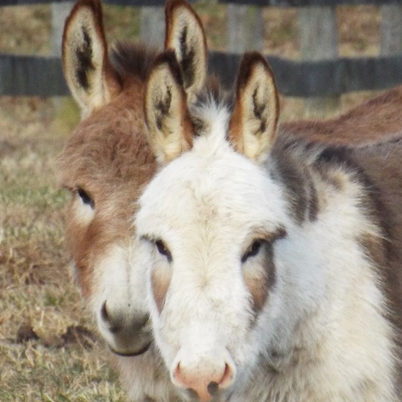There are compelling reasons why we don’t think it is appropriate to use donkeys as livestock guardians.
People have capitalized on a donkey’s instinct to protect its own environment, and a donkey may indeed chase off perceived “intruders.” But donkeys themselves can and do get attacked all the time by larger predators such as coyotes, dogs, bears and wildcats. There are a few stories in circulation about donkeys that have killed or chased off such predators, but those examples are very few and far between. Much more common are stories of donkeys getting injured and/or killed by these very same predators.
Donkeys are equines and need to be cared for as such. They need to be handled and groomed. Their feet/hooves need regular trimming at least every 8 weeks or so. They need vaccinations, dental care, de-worming and relief from flies. Most of the time, people who want to use donkeys as livestock guardians are not seasoned, experienced equestrians. They usually have no idea how to properly care for a donkey. Donkeys used as guardians very rarely receive any of the proper care they need. They aren’t handled regularly, so they don’t accept people working with their feet and legs – if they can be caught at all! Because an unhandled donkey isn’t good about having its feet worked with, the owner simply doesn’t get a farrier to trim its feet. They don’t get regular vaccinations or any vet care, and never receive proper dental care. THIS is what we see happening to donkeys that are used as livestock guardians. In this day and age, a donkey doesn’t really have any “value” to owners using them as guardians. The livestock is what the owners value, and the guardian donkey is used up and discarded when it is difficult to have around.
Donkeys have very different nutritional needs than almost any other livestock. Their systems are extremely efficient with the nutrients that they take in. They require a lot less food than other livestock to stay a healthy weight, and thus, when exposed to the unlimited grass, good hay, and sometimes grain that the other livestock get to eat, a donkey can and does become dangerously obese. They develop fat pads and lumps all over their body that become very difficult to get rid of even after years of proper diet. This excess fat can be very dangerous to the donkey later in life, and can cause serious organ problems.
In addition, donkeys can suffer from laminitis, a very painful condition in their feet that originates with excess sugars in the diet. It’s complicated and difficult for people to understand how donkeys’ feet can be affected by what they eat, but it is a major factor that anyone who owns an equine should fully understand! Laminitis, which leads to founder (a more severe condition), is incredibly painful, and almost 100% preventable with proper diet and care. Because of donkeys’ specialized dietary needs, it is not practical, and almost impossible, to care for the donkeys the way they should be maintained while they live with other livestock.
Lastly, donkeys may very well injure or kill the livestock that they are supposedly there to protect. They don’t necessarily have any affinity whatsoever for other animals. An intact jack (one that has not been gelded) is especially dangerous, and will very likely kill others, especially the babies. A jenny or a gelding might not be quite as aggressive, but may still target other livestock. The main point is that they don’t feel any protective instincts toward these other animals. It might just be luck that, if a donkey happened to protect its own environment, it also protected the other livestock. Much more often, though, we hear countless stories about donkeys acting aggressively toward the other livestock. People call us all the time asking us why the donkey is doing that, how can they stop this behavior, and what should they do?
The simple answer is that donkeys don’t make good guardians. They want to live with other donkeys and play and roughhouse with each other. They rely on each other for protection and companionship. When donkeys are together, they take turns looking after each other so that one can sleep. When a donkey is alone, it never truly rests. The jacks and geldings, especially, have tons of energy and love to play and run. They play very roughly, and if there are no other donkeys to play with, the donkeys are likely to take out this energy on the other livestock, inadvertently injuring or killing them.
We take in so many “failed guardians” from people who recognize their donkeys are being mean and dangerous to the other livestock. In every case, the donkey was not properly cared for. Their hooves never were trimmed properly, if at all. They hadn’t been handled much or at all, and many were practically wild. And every single one of them was dangerously obese! The obesity is visible proof that allowing them to live and graze unrestricted in pastures with the rest of the livestock, eating the others’ hay and feed, is terrible for the donkey. We have never seen a donkey used as a guardian that was well handled and expertly cared for – not even once!
We implore people NOT to listen to the outdated idea that donkeys are great livestock guardians. They are not! And they should not be used this way. Donkeys deserve much better than this.
